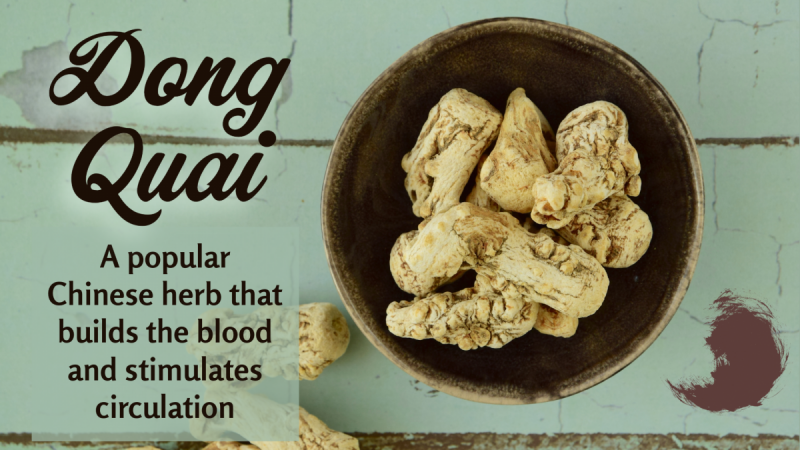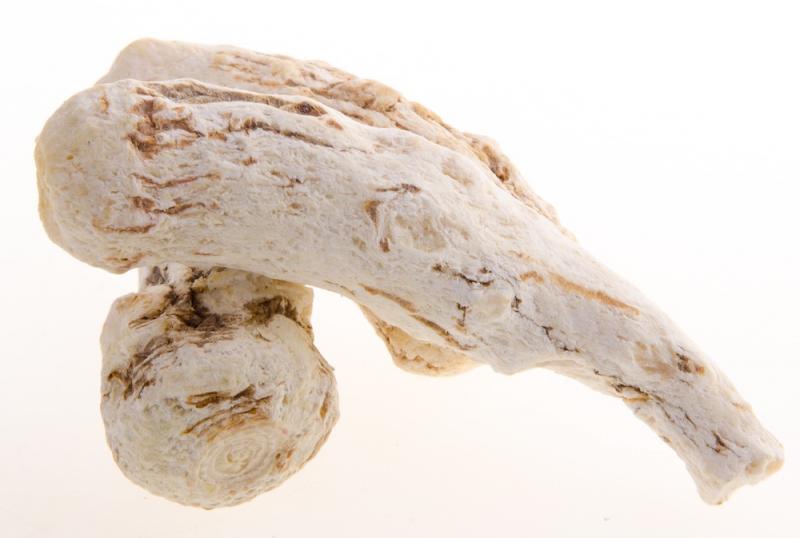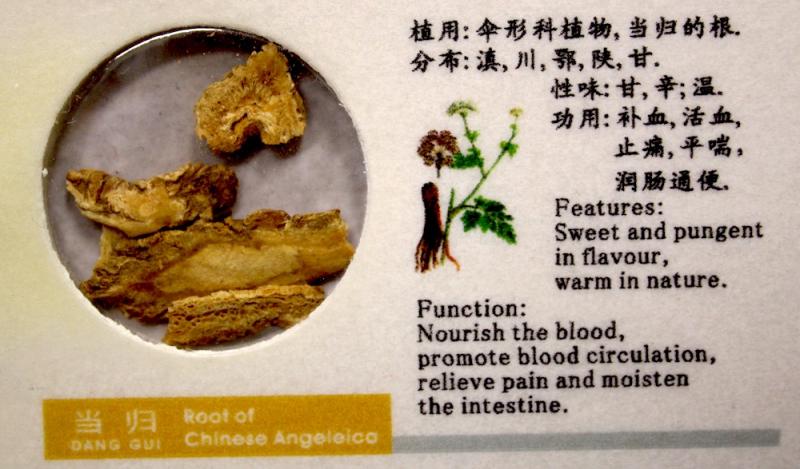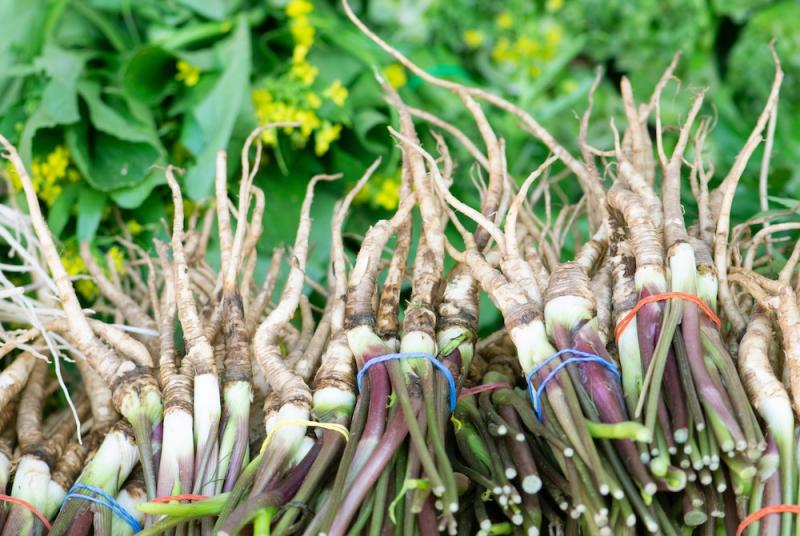
There are levels of understanding when it comes to herbs. One level is reading about them, such as reading this article. Another level is to experience using them on yourself or others as a capsule. And another level is to experience the plant directly using your own senses, whether that’s observing it growing or tasting and smelling it.
I love teaching live classes where we do the latter. I remember getting some slices of dong quai from a Chinese herb shop in Las Vegas and tasting them. The flavor and aroma was very pleasant. The odor reminded me of celery, and the flavor made me think of carrots. It’s in the same family as both and has a food-like quality, but is more of a medicine than a food. Dong quai (Angelica sinensis) is known as dang gui in China and is closely related to the Western herb angelica (Angelica archangelica).
Dong Quai as a Female Tonic
 Dong quai has been thought of as the female ginseng, since it is so widely used for female reproductive problems in China. It’s also primarily known as a female tonic in the West as well. However, many people mistakenly believe that this is because it is hormonal (estrogenic) in nature. Research suggests it isn’t. And it’s use for female troubles is not related to the Western idea of balancing hormones.
Dong quai has been thought of as the female ginseng, since it is so widely used for female reproductive problems in China. It’s also primarily known as a female tonic in the West as well. However, many people mistakenly believe that this is because it is hormonal (estrogenic) in nature. Research suggests it isn’t. And it’s use for female troubles is not related to the Western idea of balancing hormones.
Instead, it’s primarily considered a blood (xue) tonic in TCM. It’s recommended to women primarily because of the blood loss that occurs every month during mensus. Dong quai helps to nourish and support the production of blood to maintain women’s health during childbearing years. It helps to build up deficient blood in women who are cold and pale.
Dong quai also helps to stimulate blood circulation, especially in the abdominal area. Ginger also does this and both have been used to ease female cramping and pain. The aromatic quality of dong quai also means it’s a qi tonic, giving it a warming quality. Pain is believed to be caused by stagnation of blood and energy (qi) in TCM so this is another quality that makes it helpful for female reproductive problems.
Female Tonic Formulas
 Herbs are typically used as part of formulas in TCM, rather than as singles, and dong quai is no exception. Dong quai is frequently used as part of a female tonic that includes herbs like rehmannia, peony, ligusticum, codonopsis, and bupleurum. It has also been used in Western female tonic formulas where it has been combined with herbs like vitex (chaste tree), wild yam, blue cohosh, black cohosh, and red raspberry. It’s also been used in formulas to aid the transition through menopause.
Herbs are typically used as part of formulas in TCM, rather than as singles, and dong quai is no exception. Dong quai is frequently used as part of a female tonic that includes herbs like rehmannia, peony, ligusticum, codonopsis, and bupleurum. It has also been used in Western female tonic formulas where it has been combined with herbs like vitex (chaste tree), wild yam, blue cohosh, black cohosh, and red raspberry. It’s also been used in formulas to aid the transition through menopause.
When dealing with female reproductive problems I’ve always used dong quai in formulas and not as a single remedy. For instance, I’ve had good results with a Chinese blood tonic formula, bu xue (which means build blood), that contains ingredients like peony root, dong quai, ganoderma, lycium, bupleurum, ligusticum, and rehmannia root. I've found it to be a good blood tonic for women who are pale, tired, and anemic and suffer from heavy menstrual bleeding. I’ve also had good results with a formula of dong quai and black cohosh for hot flashes during menopause.
Other Uses for Dong Quai
 Despite dong quai’s popularity as a female herb, it’s more than that. It’s equally valuable for men who are anemic or blood deficient and it’s also helpful for circulatory problems because of its blood-stimulating activity. It helps to inhibit platelet aggregation to reduce the risk of thrombosis and can be used like ginger in formulas to improve blood circulation. It also helps moisten the stools to relieve constipation associated with blood deficiency.
Despite dong quai’s popularity as a female herb, it’s more than that. It’s equally valuable for men who are anemic or blood deficient and it’s also helpful for circulatory problems because of its blood-stimulating activity. It helps to inhibit platelet aggregation to reduce the risk of thrombosis and can be used like ginger in formulas to improve blood circulation. It also helps moisten the stools to relieve constipation associated with blood deficiency.
It has also been used in TCM for coughs and respiratory problems. It has some immune-enhancing properties and can help to fight infections. The essential oil in dong quai has an antibacterial effect. Other things it has been used for in TCM (usually as part of a formula) include angina, chills, diabetes, hypertension, headaches, nephritis, and lumbago.
Using Dong Quai
Dong quai is not estrogenic and appears to be quite safe even in larger doses. However, it should not be taken during menstruation as its blood-moving and thinning properties can increase bleeding. It should also be avoided if a person is taking blood thinners. If you want to take it as a single, use one to two capsules (or 30-60 drops of a tincture) two to three times daily. To ease PMS and related problems, it’s best to take it during the latter half of the cycle, beginning ten days before the start of menstruation.
Because it’s such a pleasant tasting remedy you can also take it as a decoction. I found some interesting recipes for dong quai soup. One is a dong quai and Chinese date soup used as a female tonic. Another is a chicken soup with dong quai and astragalus as a general health tonic.
Steven's Articles
-

-
Barberry and Healthy Personal Boundaries
A thorny shrub for fighting infections and supporting…
December
-

-
The Evidence for Berberine
A yellow alkaloid found in traditional infection-fighting…
-

-
The Sensible Use of Caffeinated Herbs
Kola nuts, guarana, and yerba mate and other herbs…
-

-
The Health Benefits and Problems with Coffee
This popular caffeinated beverage can be beneficial…
October
-

-
Understanding Caffeine & Cellular Adaptation
Preserving the power of caffeine's buzz and the…
September
-

-
Horseradish
A pungent spice for aiding protein metabolism…
-

-
Banaba or Crepe Myrtle
A beautiful tree from Southeast Asia whose leaves…
August
-

-
Monkeyflowers
Flower essences to help see ourselves more clearly…
-

-
Mariposa Lilies
Strengthening the bond between mother and child…
-

-
The Noble Bay Leaf
A common kitchen herb for aiding digestion and…
-

-
Epimedium: Horny Goat Weed
A circulatory stimulant and kidney yang tonic…
July
-

-
The Medicinal and Nutritional Benefits of Apricots
A nutritious fruit and valuable medicinal seed for coughs
-

-
Dogwoods
Asian dogwood is used to stop excessive discharge,…
June
-

-
Neem: The Village Pharmacy
A popular Ayurvedic remedy for dental and immune…
-

-
Spilanthes: The Toothache Plant
A traditional remedy for teeth and gums, as well…

